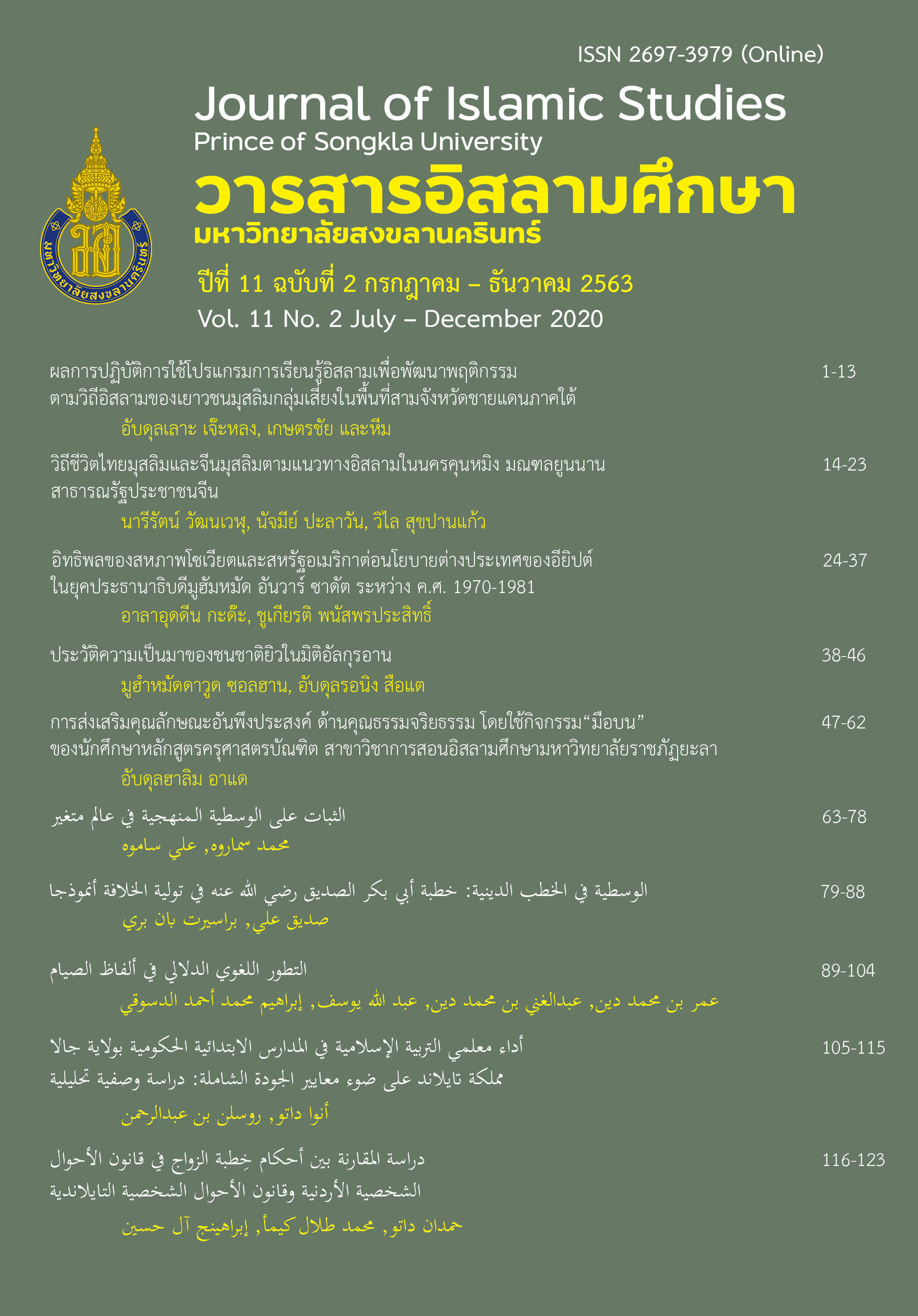The Effects of Use of Islamic Learning Program for Islamic Behavior Development among Muslim Risk Youth in Three Southern Border Provinces of Thailand
Keywords:
Islamic Learning Program, Islamic Behavior, Muslim YouthAbstract
The objective of this action research was to compare the results of the actions using Islamic learning program to develop Islamic behavior of Muslim risk youth in the three southern border provinces before and after the operation. Action groups are 45 Muslim risk youth in three Southern border provinces using pilot study techniques. Data were collected from the Islamic Behavior Assessment Test (IBAT) of Muslim risk youth in three southern border provinces. The data were analyzed using mean, standard deviation, and t-test.
The results revealed that comparison of Islamic behavior of Muslim risk youth in three Southern border provinces in all aspects had higher level of behavior in accordance with Islamic ways after program participation with statistical significance at the level of .01.
References
เกษตรชัย และหีม. (2560). เยาวชนมุสลิมกับพฤติกรรมตามวิถีอิสลาม. กรุงเทพฯ: โอเอส พริ้นติ้งเฮาส์ จำกัด.
ชัยวัฒน์ สุทธิรัตน์. (2559). 80 นวัตกรรมการจัดการเรียนรู้ที่เน้นผู้เรียนเป็นสำคัญ. นนทบุรี: พีบาลานซดีไซด์แอนปริ้นติ้ง.
ทิศนา แขมมณี. (2544). การพัฒนากระบวนการเรียนรู้ของโรงเรียน: การศึกษาพหุกรณี. รายงานวิจัย: สำนักงานกองทุนสนับสนุนการวิจัย.
ทิศนา แขมมณี. (2554). ศาสตร์การสอนองค์ความรู้เพื่อการจัดกระบวนการเรียนรู้ที่มีประสิทธิภาพ (พิมพ์ครั้งที่ 14). กรุงเทพฯ: สำนักพิมพ์แห่งจุฬาลงกรณ์มหาวิทยาลัย.
พระพหรมคุณากรณ์ ป.อ. ปยุตฺโต. (2549). การพัฒนาที่ยั่งยืน (พิมพ์ครั้งที่ 10). กรุงเทพฯ: มูลนิธิโกมล คี ทอง
วรากรณ์ สามโกเศศ. (2562). Global Change. กรุงเทพฯ: บุ๊คสเคป.
ศูนย์อำนวยการบริหารจังหวัดชายแดนภาคใต้. (2560). รายงานประจำปี 2550 ศูนย์อำนวยการบริหารจังหวัดชายแดนภาคใต้. ยะลา: ผู้แต่ง.
สำนักงานคณะกรรมการพัฒนาการเศรษฐกิจและสังคมแห่งชาติ. (2559). แผนพัฒนาเศรษฐกิจและสังคมแห่งชาติฉบับ ที่ 12 พ. ศ. 2560 - 2564. กรุงเทพฯ: ผู้แต่ง.
Adler, M. (1988). Reforming Education. New York: Collier book.
Downloads
Published
How to Cite
Issue
Section
License
Copyright (c) 2020 Journal of Islamic Studies, Prince of Songkla University

This work is licensed under a Creative Commons Attribution 4.0 International License.
All articles Published in The Journal of Islamic Studies are author’s opinions, and not the responsibility of the Faculty of Islamic Sciences nor the editorial board. However any citation should be referred to the journal.
















